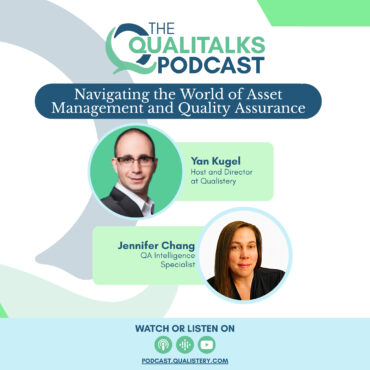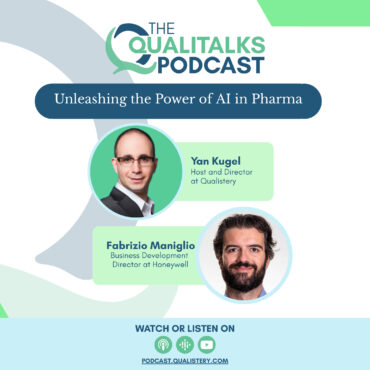
Why You Should Become a GMP Auditor and How to Do It
Today, most experienced pharmaceutical professionals want to become quality auditors, but they are not guided well or not having that much information about how to do it. By listening to […]
Jennifer Kussauer June 8, 2020 418

Building a successful career in pharma is complicated and requires specific tools, knowledge, and traits. Nonetheless, you can do it with any educational background if you have a healthy hunger for knowledge.
Jennifer Kussauer studied communication. Nonetheless, she built a fantastic pharma career and functioned as an Associate Director, Head of Audits and Inspections Management at Merck KGaA, Darmstadt, Germany. Now she is an independent QA/QM Consultant.
In this podcast episode, Jenni shares how she managed to build a great career without scientific education. We also dive into the fascinating world of GXP audits.
Here are some of the main discussed topics:
☑️ A career in Pharma Without Natural Sciences Background. Is It Possible?
☑️ The Advantages of Starting Your Career in Smaller Companies
☑️ The Know-How You Need to Become a Good Auditor
☑️ ISO vs. GMP
Table of Contents
Having experience in chemistry or biology is essential if you need to control or develop the process, but not for most of the pharma positions. However, there are many positions in the pharma where you can learn everything on the job. For example, working in manufacturing, procurement, or the QA department.
If you are willing to learn and make your efforts to learn from experienced colleagues, you will succeed with any educational background!
You can build a successful career in pharma with any education if you are ready to learn new things and remain curious.
The only thing you need to do is find a way into any pharmaceutical company or a CRO in any position (e.g., data entry and assistance).
Any such experience would give you a broad idea about the data management & system of organization.
Afterward, you could shift to other positions in the pharmaceutical industry where you can get a proper idea of the drug manufacturing process in detail. Each department has a specific role in pharmaceuticals production, from purchasing raw materials to finished products. Therefore, working in multiple departments and gaining practical and theoretical knowledge of the production processes and guidelines would help you climb higher in your career.
The beauty of working in a small company is that you would get much more responsibility than in a big organization.
In a small company, for example, there could be only a few people in the Quality Assurance (QA) department who do everything. In a big company, you would have dozens of people, each with a very responsibility area.
Therefore, working shortly in a smaller company would allow you to learn much more about how the whole manufacturing process ticks than years in a large company.
Subscribe:
To be a good auditor, you have to know your standards (GMP, GDP, ISO, etc.). There is no way around it!
If you don’t know the regulations, you cannot efficiently recognize deficiencies and defend your stand if needed.
It helps to know the pharmaceutical processes, but you don’t have to be an expert in every detail. The people in the department or company you visit are the experts! You are the one who needs to listen well and ask the right questions to understand what they explain.
The Qualified Persons (QP) are responsible for the certification and release of pharmaceutical substances in the EU. Therefore, they must have a deep understanding of pharmaceutical production and must have a scientific background. Also, most QPs would have an extensive GMP auditing experience. Thus, to be a good QP, one has to be curious and a generalist. However, they don’t have to be proficient in standards outside of the pharma, as ISO 9001.
A GxP auditor, on the other hand, has to know a variety of standards from various industries. The reason for that is that a GxP auditor has to audit also companies that must not comply with GMP, but with ISO standards.
What makes a professional auditor and QP alike, is the hunger for knowledge and a healthy curiosity for processes and events.
GMP refers to a system of manufacturing that guarantees the reproducibility of product quality to set specifications.
On the other hand, ISO offers a standard for operating a firm from management through manufacturing for food safety, agriculture, and healthcare.
GMP is more specific towards safety whereas ISO is quite particular for the client satisfaction
GxP: General acronym for the “Good Practice” like GMP, GDP, GVP, GCP, GAP, GLP, etc.
GMP: Good Manufacturing Practices
GDP: Good Documentation Practices
GVP: Good Pharmacovigilance Practices
GCP: Good Clinical Practices
GAP: Good Auditing Practices
GLP: Good Laboratory Practices
QA: Quality Assurance
QMS: Quality Management System
CRO: Clinical Research Organization
QP: Qualified Person
ISO: International Organization
ECR: Electronic
Information on good manufacturing practices (GMP) in the life science industry is scattered, vague and poorly organized. We have chosen to solve this problem by organizing the best possible GMP webinars and courses to ensure we deliver all the information you need in a concise, engaging and clear format. All events are free and open to anyone in the industry.
Browse Upcoming Free GMP Webinars
Tagged as: Pharma, Audits, Career.
Jennifer Kussauer is a Senior International GxP Auditor, QA/QM Consultant with expertise in GCP/GVP/GMP/GDP. Before becoming an independent consultant, Jennifer served as Associate Director, Head Audits and Inspections Management at Merck KGaA in Germany.

Today, most experienced pharmaceutical professionals want to become quality auditors, but they are not guided well or not having that much information about how to do it. By listening to […]


Copyright © 2023 Qualistery